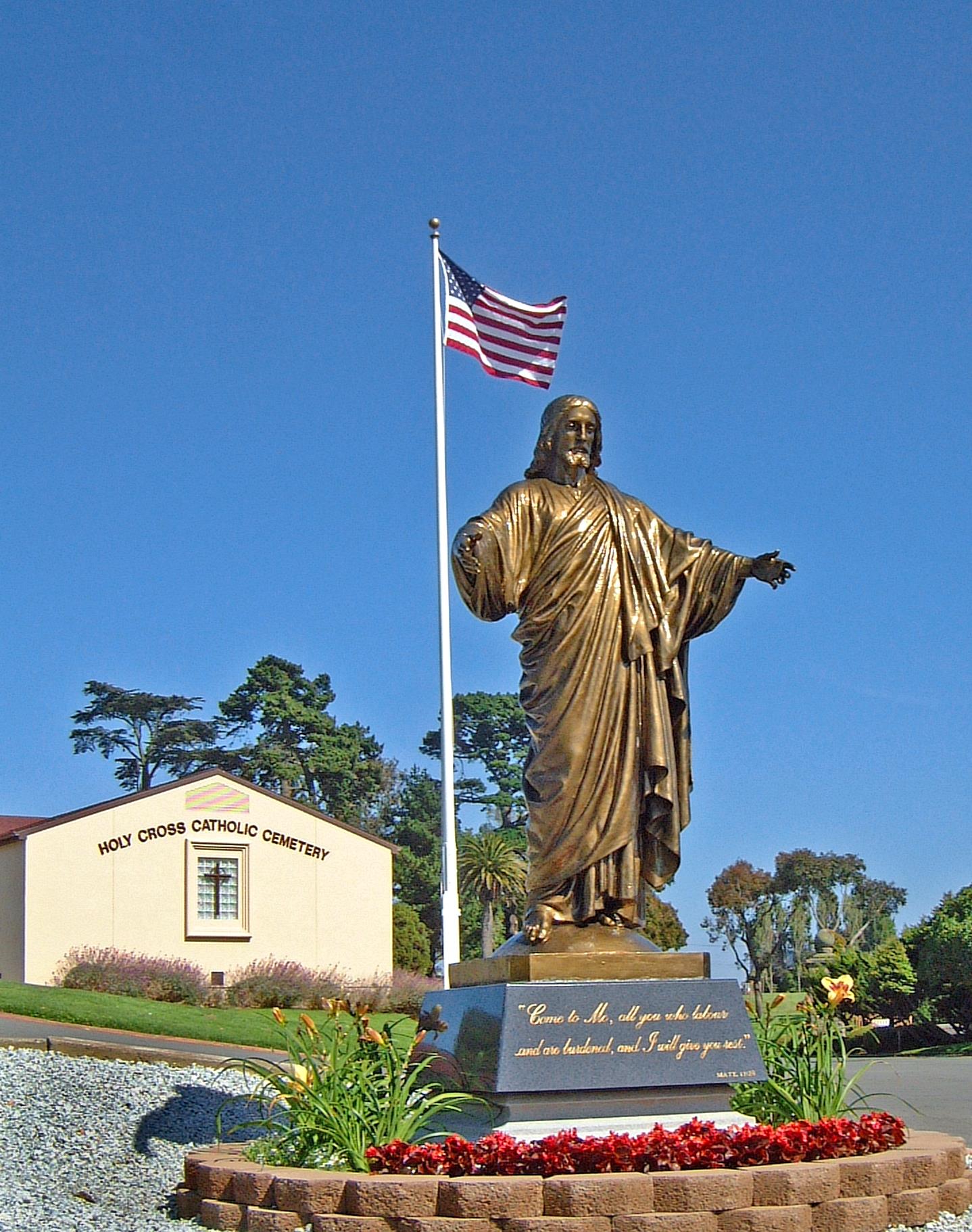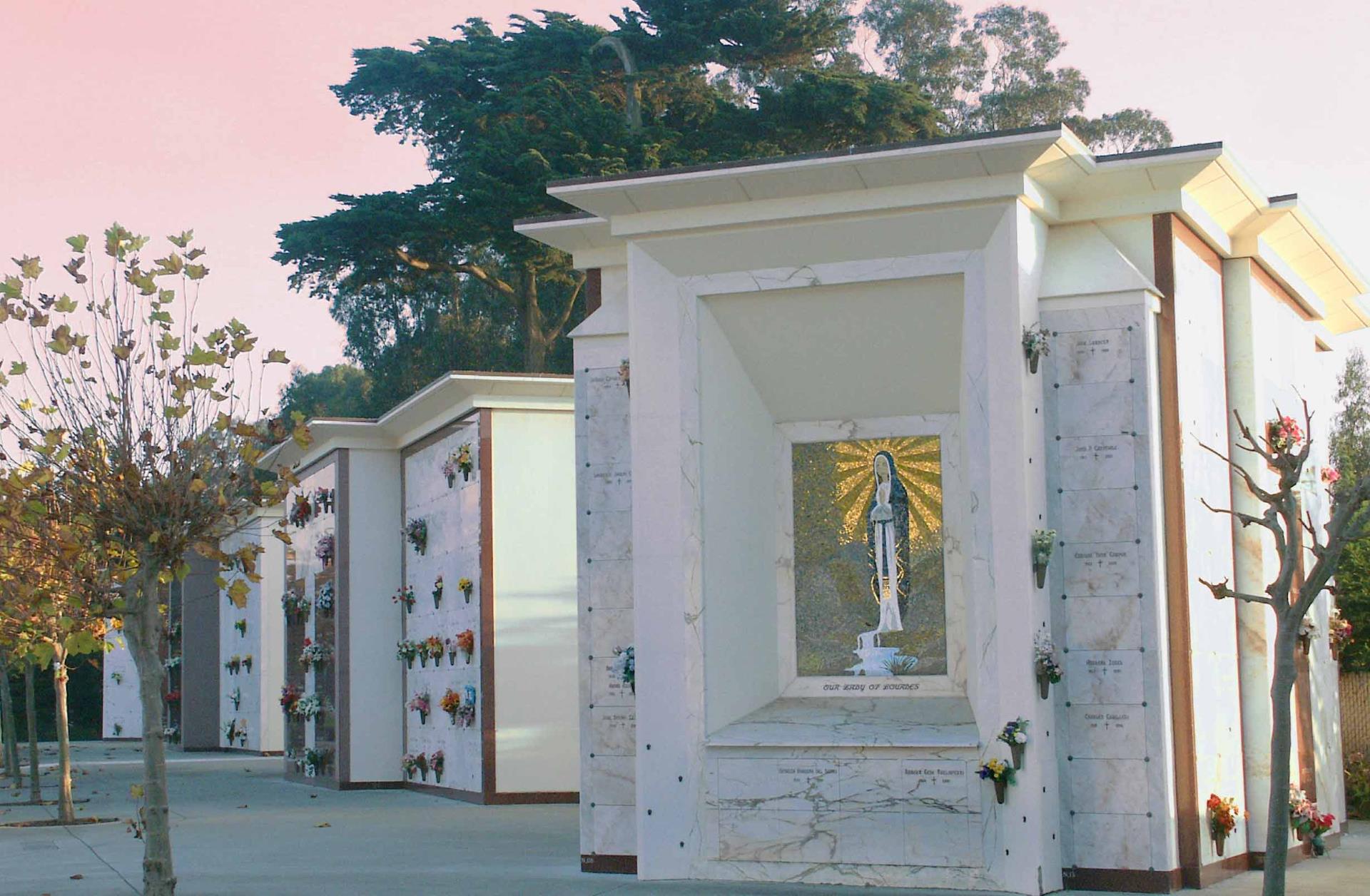Catholic cemeteries have a long tradition of dedicated service to the Catholic community including non-Catholics spouses, children, parents and other relatives. Christians with a connection to the Catholic Community may also be buried in the Catholic Cemeteries.
It is only natural that those who share the same faith in life will wish to carry on that sense of community in death. When it comes to the issue of death, the sensibilities and needs of Catholics are unique and call for certain practices in the handling and care of the remains of the deceased. Therefore, in the blessed grounds of a Catholic cemetery there are safeguards — mandated by the Church’s Canon Law — which guarantee permanence, reverence and respect for the remains of the deceased.
Personal preference and/or family tradition influence choices in this regard. Above ground entombment in a crypt building appeals to many people, including those who aren’t comfortable with traditional below ground burial. Indoor mausoleum crypts are conducive to visitation in inclement weather.
Yes. By making arrangements in advance, Catholic families can avoid confusion at the time of bereavement and assure themselves of burial and arrangements in the location they desire, and at a price they wish to pay. You will find our non-commissioned counselors knowledgeable and sensitive to your needs.
It has been our experience that generally, a husband and wife buy space for themselves. Many families decide to purchase adjoining plots to form a family group. Family plots are also available and can accommodate larger headstones. Crypts for full size caskets and niches for cremated remains may be purchased individually or in family groups. Private rooms in All Saints Mausoleum are available that can accommodate many family members. “Private Estates”, distinctively designed personal, private family mausoleums, may also be purchased.
No. Holy Cross is an endowment care cemetery. A one-time endowment care fee is charged at the time you purchase a grave, crypt or niche. The money is placed in a special trust fund, the proceeds of which are used to cover future maintenance costs throughout the cemetery.
There are a variety of payment options and terms designed to give you the flexibility to remain within your personal budget. Cash, check, MasterCard and Visa are honored for your convenience. Terms may be arranged with a down payment made at the time of a pre-need purchase, followed by interest free monthly payments. At the time of death, the burial arrangements are to be paid in full. Special terms are available for persons in need. Holy Cross also accepts assignments of valid insurance policies for payment at the time of need.
Yes. Holy Cross Catholic Cemetery will refund the amount you prepaid, minus a nominal cancellation fee.
Monuments conform to the regulations that govern different areas of the cemetery. These regulations are not arbitrary, but are designed to both enhance the care and overall beauty and character of each section of the cemetery. Memorial benches are available in various sections in the cemetery.
No. The purchaser has an exclusive and permanent right of use through an easement conveyed by Holy Cross Catholic Cemetery. This right passes to direct blood heirs immediately after the death of the recorded owner, although the spouse has the first right of burial. This applies to all graves, crypts and niches in the cemetery. Written permission of the heirs-at-law may be required for burial. It is advisable to secure permission in advance and place it on file in the cemetery office to prevent unnecessary stress a the time when permission is essential.
Yes, in 1963 the Catholic Church eliminated its prohibition against cremation. Although cremation represents a means of disposition preferred by many, it is not the “final disposition” — burial is. Human cremated remains are still the body of the deceased — just in a different form. Thus, cremated remains should be treated with the same respect as the “full” body is treated prior to cremation. They should be buried in a cemetery. Honoring and respecting the deceased by keeping their remains safe, undisturbed, and memorialized is a time honored tradition. It is important to everyone to be remembered. It is also important for family members and future generations to visit these graves — even if only once. We can tell that from the large numbers of people who visit the cemetery each year doing their family genealogy!
No the document kept on file at the cemetery is called a “permit for disposition”. It is issued by the Health Department Registrar in the county in which the deceased expired. California State Law requires that a properly executed death certificate be presented to the Health Department Registrar who subsequently issues the “permit for disposition”. This document must accompany the deceased to their final destination. Cemeteries cannot initiate burial without this permit and must keep it permanently on file (California Health & Safety Code 10376.8, 10376 & 10378). Actual death certificates may be obtained from the registrar in the county in which the death occurred.
Yes. For more information, or if you have additional questions, please contact your parish priest.
Yes. It is recognized that those who die from the act of suicide deserve understanding and compassion. The deceased may have been suffering from a serious psychological instability, or overwhelming fear and confusion. Therefore, the church offers funeral and burial rites for those who may have died as a result of suicide. The American edition of the Catholic ritual includes prayers for this specific situation. These prayers evoke forgiveness for the departed and consolation to their family.


